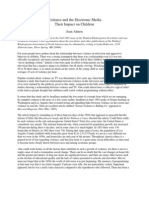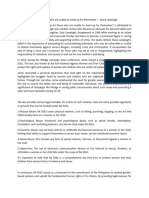COVID-19 Can Be Fatal, So Can Gender-Based Violence
COVID-19 Can Be Fatal, So Can Gender-Based Violence
Uploaded by
Jobelle De Vera TayagCopyright:
Available Formats
COVID-19 Can Be Fatal, So Can Gender-Based Violence
COVID-19 Can Be Fatal, So Can Gender-Based Violence
Uploaded by
Jobelle De Vera TayagOriginal Description:
Original Title
Copyright
Available Formats
Share this document
Did you find this document useful?
Is this content inappropriate?
Copyright:
Available Formats
COVID-19 Can Be Fatal, So Can Gender-Based Violence
COVID-19 Can Be Fatal, So Can Gender-Based Violence
Uploaded by
Jobelle De Vera TayagCopyright:
Available Formats
TAYAG, JOBELLE D.
BEED 2C 03/02/21
Activity No. 1 (individual report)
COVID-19 can be fatal, so can gender-based violence
Bernice Beltran (2020, June 10). COVID-19 can be fatal, so can gender-based violence. ABS
CBN NEWS. https://news.abs-cbn.com/spotlight/multimedia/slideshow/06/09/20/photo-story-
covid-19-can-be-fatal-so-can-gender-based-violence.covid-19 can-b- fatal-so-can-gender-
based-violence
On the evening Everyone thought Amy was already dead when her neighbors rushed her to a
nearby hospital in Manila of March 1, because while cooking dinner for her family, Amy felt a
cold blade sinking into her flesh near her breast "You're a slut!" her partner Dan yelled at her as
he pushed the dagger deeper "Whore!" he shouted, pulling the blade and thrusting it into her
back “Help! Someone help me,” Amy howled in pain as she called her neighbors. She blacked
out after losing so much blood that was the last time she saw Dan.
Many victims of GBV in low-income communities of ten endure violence at home as filing
charges against the perpetrators could mean losing the ‘breadwinners’ of their families, even so,
violence could lead to permanent disabilities, unwanted pregnancies, trauma, and death. Since
Amy gave birth to her eldest son seven years ago, Dan’s toxic behavior began to surface,
despite not having evidence other than seeing his wife wearing makeup, he accused her of
seeing someone else, he dragged his wife like a rag doll and beat her up, this went on almost
every week but with three sons to raise, and Amy had no time to grieve as she worked in a
canteen in the fish port from early evening until before dawn where she earned P150 a day
(US$ 3) with only a few hours of sleep, she woke up at 7 AM to do all the household chores until
the afternoon, while Dan spent more time drinking than actually providing for his family.
Moreover, if her neighbors did not hear her calls for help on the night of March 15, Amy was
certain that it would have been the end of her life, and also it was the only time when authorities
took her seriously, and Dan was finally sent to jail.
This raises concern from several human rights and feminist groups as it reflects the lack of
‘gender dimension’ in the government’s current COVID-19 response and the imposition of the
ECQ, which restricted movements of residents to curb the coronavirus outbreak, presented
additional hurdles for many women and children in accessing services meant to protect them.
You might also like
- We Still Here: Pandemic, Policing, Protest, & PossibilityFrom EverandWe Still Here: Pandemic, Policing, Protest, & PossibilityRating: 4.5 out of 5 stars4.5/5 (10)
- The Beast I Loved: A Battered Woman's Desperate Struggle to SurviveFrom EverandThe Beast I Loved: A Battered Woman's Desperate Struggle to SurviveRating: 3 out of 5 stars3/5 (6)
- If You Are Asked To Lecture On Education 4Document2 pagesIf You Are Asked To Lecture On Education 4Jobelle De Vera Tayag67% (3)
- Green Hill School Total IncidentsDocument3 pagesGreen Hill School Total IncidentsKING 5 NewsNo ratings yet
- Fake Online Love Affair Becomes Legal BattleDocument4 pagesFake Online Love Affair Becomes Legal BattleDan HeatonNo ratings yet
- Vigilante 2 PDFDocument3 pagesVigilante 2 PDFAnonymous BRJICXZlNo ratings yet
- Domestic Abuse Victim RememberedDocument5 pagesDomestic Abuse Victim RememberedTony GicasNo ratings yet
- Social JusticeDocument6 pagesSocial Justiceapi-669598041No ratings yet
- Examination Questions and Answers: Loveless: Complete Criminal Law 5e, Chapter 10Document4 pagesExamination Questions and Answers: Loveless: Complete Criminal Law 5e, Chapter 10Shantel Scott-LallNo ratings yet
- Criminal Minds LawDocument5 pagesCriminal Minds Lawkmanleen620No ratings yet
- "The Color of Health" by Common Ground HealthDocument27 pages"The Color of Health" by Common Ground HealthPatrick CrozierNo ratings yet
- Phoebe Prince: Should School Bullying Be A Crime?: Killed Themselves Tyler ClementiDocument4 pagesPhoebe Prince: Should School Bullying Be A Crime?: Killed Themselves Tyler Clementimrounds5No ratings yet
- Seven Pounds Movie Review 1Document4 pagesSeven Pounds Movie Review 1api-511033196No ratings yet
- Aguilar - Edwards - Reading and WrittingDocument2 pagesAguilar - Edwards - Reading and WrittingLoisBornillaNo ratings yet
- News Report - HOW A YOUNG WOMAN FORCED TO USED A WHEEL CHAIR, TREATED FOR SEVERAL ILLNESESS ENDED UP IN PRISON FOR HER MOTHER'S MURDERDocument14 pagesNews Report - HOW A YOUNG WOMAN FORCED TO USED A WHEEL CHAIR, TREATED FOR SEVERAL ILLNESESS ENDED UP IN PRISON FOR HER MOTHER'S MURDERDrifer MarbunNo ratings yet
- Reading Eagle Death Penalty Series Day 5Document3 pagesReading Eagle Death Penalty Series Day 5Reading_EagleNo ratings yet
- BIT224 - IT AND BUSINESS CRIME-Assignment 1Document9 pagesBIT224 - IT AND BUSINESS CRIME-Assignment 1Syed Nauman HashmiNo ratings yet
- Bar ExamDocument3 pagesBar ExamJay Carlo Bagayas0% (1)
- Project 3Document8 pagesProject 3api-580891467No ratings yet
- United States Court of Appeals: For The First CircuitDocument17 pagesUnited States Court of Appeals: For The First CircuitScribd Government DocsNo ratings yet
- Deadly Darlings: The Horrifying True Accounts of Children Turned Into Murderers: Murder and Mayhem, #2From EverandDeadly Darlings: The Horrifying True Accounts of Children Turned Into Murderers: Murder and Mayhem, #2No ratings yet
- Monica B. Pearl: The City of Brotherly Love: Sex, Race, and AIDS in PhiladelphiaDocument19 pagesMonica B. Pearl: The City of Brotherly Love: Sex, Race, and AIDS in PhiladelphiaDanger AhmadNo ratings yet
- Sandra Bland's Family Orders Independent Autopsy After Alleged Jail SuicideDocument1 pageSandra Bland's Family Orders Independent Autopsy After Alleged Jail SuicideTristan ScottNo ratings yet
- Tito Sotto Is An Asshole PDFDocument11 pagesTito Sotto Is An Asshole PDFCarunungan ITNo ratings yet
- BullyingDocument6 pagesBullyingjhanelleNo ratings yet
- 4Document4 pages4api-242831588100% (1)
- 2020.12.24 Lisa Marie Montgomery Petition For Executive ClemencyDocument51 pages2020.12.24 Lisa Marie Montgomery Petition For Executive ClemencyUSA TODAY NetworkNo ratings yet
- Married to Murder: The Bizarre and True Accounts of People Who Married MurderersFrom EverandMarried to Murder: The Bizarre and True Accounts of People Who Married MurderersRating: 2 out of 5 stars2/5 (2)
- Future Perfect 15Document17 pagesFuture Perfect 15ɱʌɾk ƉʌɾkNo ratings yet
- Oj SimpsonDocument1 pageOj Simpsonmohammed.darwish572007No ratings yet
- RkellypaperDocument4 pagesRkellypaperapi-534367135No ratings yet
- Death PenaltyDocument18 pagesDeath PenaltyAna BaciuNo ratings yet
- Deadly Force: A Police Shooting and My Family's Search for the TruthFrom EverandDeadly Force: A Police Shooting and My Family's Search for the TruthRating: 4 out of 5 stars4/5 (1)
- Group 48 Newsletter - June 2013Document10 pagesGroup 48 Newsletter - June 2013Joanne LauNo ratings yet
- Missing ManDocument4 pagesMissing Manwamu885No ratings yet
- Violence and The Electronic Media - Their ImpactDocument5 pagesViolence and The Electronic Media - Their ImpactyulemboismndialalaNo ratings yet
- Appellee Vs Vs Appellant: en BancDocument26 pagesAppellee Vs Vs Appellant: en BancZoe Kristeun GutierrezNo ratings yet
- PenaltiesDocument143 pagesPenaltiesRexenne MarieNo ratings yet
- Digested 10Document128 pagesDigested 10twIzNo ratings yet
- Husband Abuse, by Wendy McElroyDocument3 pagesHusband Abuse, by Wendy McElroyNicolas Martin100% (1)
- A Television Drama by Jane Rule DepictsDocument4 pagesA Television Drama by Jane Rule DepictsANgyNo ratings yet
- Gender and Crime Cyntoia Brown PaperDocument5 pagesGender and Crime Cyntoia Brown Paperapi-690916425No ratings yet
- 05272018, Transcript About Dark WebDocument5 pages05272018, Transcript About Dark WebJing DalaganNo ratings yet
- Domestic Violence Against MenDocument3 pagesDomestic Violence Against Menverismo100% (3)
- Gone Girl 1Document5 pagesGone Girl 1Kazi AsaduzzmanNo ratings yet
- Dekada 70: A Movie Review in Philippine LiteratureDocument4 pagesDekada 70: A Movie Review in Philippine LiteratureLiya Pastolero CamaristaNo ratings yet
- You Are Not An Accident: I Am Your Creator. You Were in My Care Even Before You Were Born. - Isaiah 44:2aDocument19 pagesYou Are Not An Accident: I Am Your Creator. You Were in My Care Even Before You Were Born. - Isaiah 44:2aJobelle De Vera TayagNo ratings yet
- Detailed Lesson Plan - Tayag, Jobelle D. (Beed 2c0Document16 pagesDetailed Lesson Plan - Tayag, Jobelle D. (Beed 2c0Jobelle De Vera Tayag100% (1)
- Capas (Ap)Document29 pagesCapas (Ap)Jobelle De Vera TayagNo ratings yet
- TELESERYEDocument15 pagesTELESERYEJobelle De Vera TayagNo ratings yet
- Bulliten 1Document1 pageBulliten 1Jobelle De Vera TayagNo ratings yet
- B. "Documentation of Your Own Locality/ Municipality."Document55 pagesB. "Documentation of Your Own Locality/ Municipality."Jobelle De Vera TayagNo ratings yet
- The Love of God MaricarDocument18 pagesThe Love of God MaricarJobelle De Vera TayagNo ratings yet
- Camping Google Classroom HeaderDocument1 pageCamping Google Classroom HeaderJobelle De Vera TayagNo ratings yet
- Blank Sticker Tabs TemplateDocument2 pagesBlank Sticker Tabs TemplateJobelle De Vera TayagNo ratings yet
- SeptemberDocument2 pagesSeptemberJobelle De Vera TayagNo ratings yet
- SeptemberDocument2 pagesSeptemberJobelle De Vera TayagNo ratings yet
- B. "Documentation of Your Own Locality/ Municipality.": 1. Pangalan, Lokasyon at Kasaysayan NG Iyong Barangay/lalawiganDocument39 pagesB. "Documentation of Your Own Locality/ Municipality.": 1. Pangalan, Lokasyon at Kasaysayan NG Iyong Barangay/lalawiganJobelle De Vera TayagNo ratings yet
- Mathematics Es1 Scope and Sequence Approach 1Document9 pagesMathematics Es1 Scope and Sequence Approach 1Jobelle De Vera TayagNo ratings yet
- Evaluate: (Answers Only) : Group Work-Send Answer On March 5 OnlyDocument2 pagesEvaluate: (Answers Only) : Group Work-Send Answer On March 5 OnlyJobelle De Vera Tayag100% (1)
- Story of Wildflower Pinoy ShowDocument38 pagesStory of Wildflower Pinoy ShowJobelle De Vera TayagNo ratings yet
- Story of Wildflower Pinoy ShowDocument9 pagesStory of Wildflower Pinoy ShowJobelle De Vera TayagNo ratings yet
- Ancient Greek Art Old CivilizationDocument6 pagesAncient Greek Art Old CivilizationJobelle De Vera TayagNo ratings yet
- Ancient Greek Art Old CivilizationDocument4 pagesAncient Greek Art Old CivilizationJobelle De Vera TayagNo ratings yet
- Program Prosposal1Document2 pagesProgram Prosposal1Jobelle De Vera TayagNo ratings yet
- Students Who Are Gifted and TalentedDocument43 pagesStudents Who Are Gifted and TalentedJobelle De Vera Tayag0% (1)
- Resignation LetterDocument1 pageResignation LetterJobelle De Vera TayagNo ratings yet
- School-Based Report On Incidents of Bullying SY 2020-2021Document5 pagesSchool-Based Report On Incidents of Bullying SY 2020-2021Jeraldine Mayol100% (1)
- 4th Quarter January 2023 March 2023Document132 pages4th Quarter January 2023 March 2023Krash King100% (1)
- CSE - Gender Relations, VIolence and Staying SafeDocument66 pagesCSE - Gender Relations, VIolence and Staying SafeAilene CantinaNo ratings yet
- Etats-Unis//Rapport Septembre 2019/criminal Victimization, 2018Document37 pagesEtats-Unis//Rapport Septembre 2019/criminal Victimization, 2018Sebastien de Lyon100% (1)
- Leon County Booking Report: June 6, 2021Document2 pagesLeon County Booking Report: June 6, 2021WCTV Digital TeamNo ratings yet
- Gender Based ViolenceDocument15 pagesGender Based ViolenceKris LayusaNo ratings yet
- Assault and BatteryDocument3 pagesAssault and Batterygaurav singhNo ratings yet
- Omerović, Enes S. Političko Nasilje U BiH (1918-1921)Document282 pagesOmerović, Enes S. Političko Nasilje U BiH (1918-1921)Enes S. OmerovićNo ratings yet
- Forensic AssignmentDocument23 pagesForensic AssignmentTooba KhalidNo ratings yet
- Artikel Tindakan Fisik Suami Terhadap Istri NewDocument17 pagesArtikel Tindakan Fisik Suami Terhadap Istri Newci oengNo ratings yet
- NSTP2 OlActivityDocument2 pagesNSTP2 OlActivityCamille Allexis TolentinoNo ratings yet
- SLED ReportDocument2 pagesSLED ReportLive 5 NewsNo ratings yet
- Navotas City Jail Roster of Detainees As of Sept 2020Document18 pagesNavotas City Jail Roster of Detainees As of Sept 2020Anafer BautistaNo ratings yet
- Exercise_4Document71 pagesExercise_4GerNo ratings yet
- Acid AttacksDocument2 pagesAcid AttacksbilalkianiNo ratings yet
- 3 4 Gender Based Violence MM 20.eDocument31 pages3 4 Gender Based Violence MM 20.eJoyce Ann AdlawanNo ratings yet
- Counter AffidavitDocument2 pagesCounter AffidavitPAO Janiuay District OfficeNo ratings yet
- Silent Witness Story - SC - 2008Document53 pagesSilent Witness Story - SC - 2008Wylde Faerie100% (1)
- SCC NotesDocument3 pagesSCC NotesAngelo NavarroNo ratings yet
- Violence Against Women in India: Dr.M.ChellamuthuDocument10 pagesViolence Against Women in India: Dr.M.ChellamuthuSarthak MishraNo ratings yet
- Notes On Protection of Women From Domestic Violence Act 2005Document5 pagesNotes On Protection of Women From Domestic Violence Act 2005Dakshita NagpalNo ratings yet
- Let's Stop Violence Against Women and Girls!: This Is The Story of A Friend's FriendDocument5 pagesLet's Stop Violence Against Women and Girls!: This Is The Story of A Friend's Friendmarco vargasNo ratings yet
- NCADV Economic Abuse Fact Sheet PDFDocument2 pagesNCADV Economic Abuse Fact Sheet PDFCrhis Angel Prado PumaNo ratings yet
- Admin,+100+revisi 160A Imelda+Martinelli+Edited+ok.787-792 PDFDocument6 pagesAdmin,+100+revisi 160A Imelda+Martinelli+Edited+ok.787-792 PDFDani BramNo ratings yet
- (Ons-Cleared) - End VAW 2022 Campaign - 1 - ONS-SignedDocument1 page(Ons-Cleared) - End VAW 2022 Campaign - 1 - ONS-SignedjcNo ratings yet
- Format Catpor Revisi Kelompok 2Document38 pagesFormat Catpor Revisi Kelompok 2Mira UlfaNo ratings yet
- Chastity Rape ComparisonDocument2 pagesChastity Rape ComparisonDennis Aran Tupaz AbrilNo ratings yet
- Ra 9262Document2 pagesRa 9262Angelica AngelesNo ratings yet
- Shernica English SBADocument10 pagesShernica English SBAArisha Nichols50% (2)















































































































